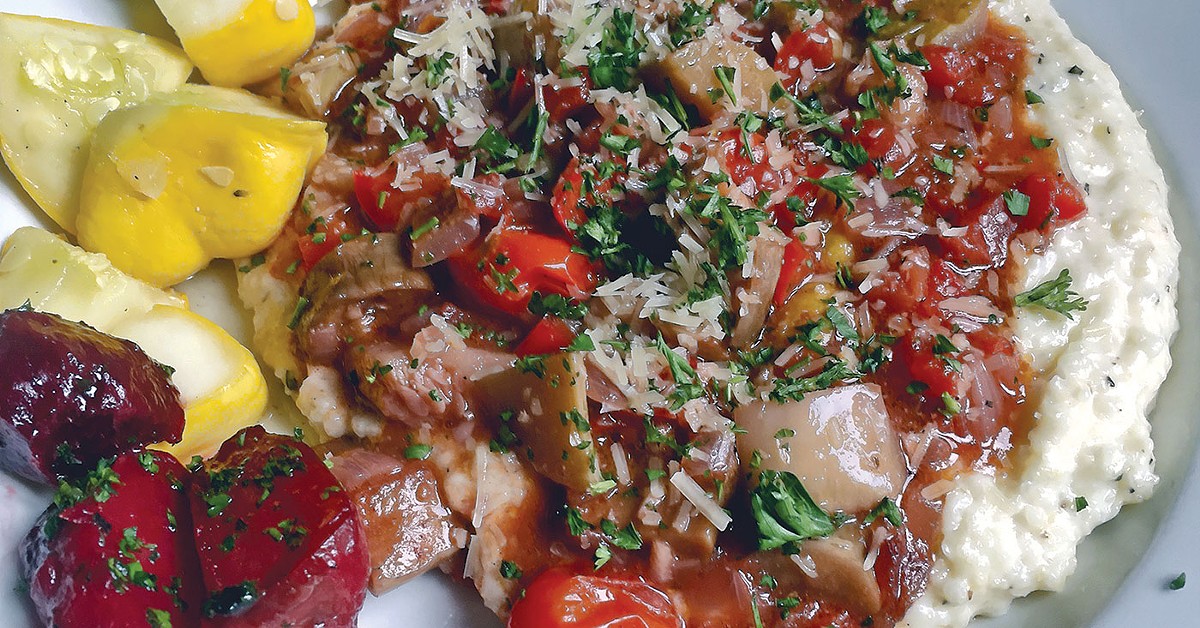Kentucky’s beautiful Shakertown at Pleasant Hill is one of my favorite places anywhere. Nestled in the shady lanes and meadows of a Mercer County hilltop, this 200-year-old restored Shaker village is a living museum and peaceful, serene getaway.
And, completing the lure, it also boasts an excellent dining room, with first-rate, upscale bistro fare served by black-clad servers in the elegant beauty of the Shaker Trustees’ House, a redbrick hostelry that dates back to the early 1800s.
Wait! Wait! Did I just say “upscale bistro fare served by black-clad servers”? What happened to Shakertown’s trademark Shaker fare, and the servers wearing Shaker attire?
Well, that’s the sad news, or sad at least for those of us who’ve grown up with Shakertown and know it as a living museum showcasing the Shakers, the millennial sect that purportedly believed in hard work, beautifully-simple design, and no sex whatsoever (because they believed the end of the world was coming too soon to bother).
Believe me, the beauty and quiet grace of the sturdy old Shaker buildings remains. We spent a relaxing overnighter there recently, and you can surely still feel the shades of the old Shakers wandering around, climbing a creaky staircase or peering into a shadowy barn.
But a few years ago, with the arrival of new management and a subtly different name — from Shakertown to Shaker Village — things began to change.
“Shakertown … is dying,” University of Kentucky political science Professor Ernest J. Yanarella wrote in 2004 in the Terrain.org environmental journal. “A steady drop in attendance, compounded by the sameness and lack of vibrancy of its presentation of the former Shaker community, hints at deeper troubles.”
Faced with declining attendance and revenue, Shakertown was starting to look a little shopworn when Maynard Crossland came on as the nonprofit educational corporation’s president and CEO in September 2011. He was charged, according to its 2015 annual report, to come up with a plan to “enliven the guest experience … as a tourism destination for a 21st-century audience.”
I’m sure that yanking a 20th-century replica of a 19th-century millennial sect into the 21st century wasn’t easy to do without breaking anything, and I’ll give them credit for keeping the spirit alive.
Shakertown — now billed as Shaker Village — has done a lot of needed paint-up and fix-up. You’ll no longer find senior-citizen volunteers in Shaker attire making brooms and rolling pills and such in replica shops. You can still get your Shaker history and culture here, but it’s best to check the website, or follow Shaker Village on social media, to match your visit to its dozens of scheduled programs. (One tip: the big annual Harvestfest is the weekend of Sept. 10-11.)
The dining room is now called The Trustees’ Table, and, thanks to a historic vote by Mercer County’s citizens to go wet a few years ago, now offers wine, beer and bourbon, with a good selection of Kentucky’s native spirit from $8 to $16 per glass.
The menu, in keeping with Shaker Village’s approach, is billed as “seed-to-table,” using local produce in season, including some vegetables from Shaker Village’s own gardens.
A half-dozen starters, soups and salads are $2.95 (for a cup of soup) to $9.95 (for a large Kentucky wilted salad tossed in hot bacon dressing). Eight dinner entrées showcase country-style flavors, with modern touches, ranging in price from $18.95 (for pan-fried catfish fried golden in a cornmeal breading) to $22.95 (for brisket slow-smoked over hardwood cut on the village property).
Our dinner began with warm dinner rolls and butter and a relish tray full of cherry tomatoes; carrot and celery sticks and raw cauliflower florets, tiny cornichons, black and green olives, baby corn and crunchy, tangy pickled okra.
Tomato-celery soup ($2.95 for a cup, $4.95 for a bowl) was another holdover from the old menu, a rather thin soup with bits of celery and a pool of melted butter on top.
Fried green tomatoes ($7.95), clad in a crisp, tempura-style breading, were good, but I’d have preferred thinner slices cooked all the way through. They came with Tabasco-laced ranch and a very sweet “Sue’s sweet pepper jelly.”
Dinner entrées were accompanied by tasty red beets and barely cooked pattypan squash from the Village garden.
Smothered pork loin ($20.95) was very good. Two firm, flavorful, thin boneless pork cutlets were served on crumbly cornbread dressing with an odd perfumed scent, and dressed with a savory white onion gravy.
If you don’t think ratatouille is a Southern dish, you just haven’t tried it over Weisenberger Mill grits with Kenny’s Kentucky white cheddar. The meatless offering of the day ($17.95) spoke of Provence, with its herb-scented, gently sautéed diced tomatoes, onions and eggplant.
Traditional Shaker lemon pie ($4.95) is timeless, flaky crust surrounding tangy lemon filling studded with bits of thin-sliced lemon peel.
With strong, freshly brewed iced tea, dinner for two was $62.68, plus a $15 tip for our pleasant, black-clad server.
The Trustees’ Table
Shaker Village at Pleasant Hill
3501 Lexington Road (Ky. Hwy. 68)
Harrodsburg, Kentucky
(800) 734-5611, ext. 360







